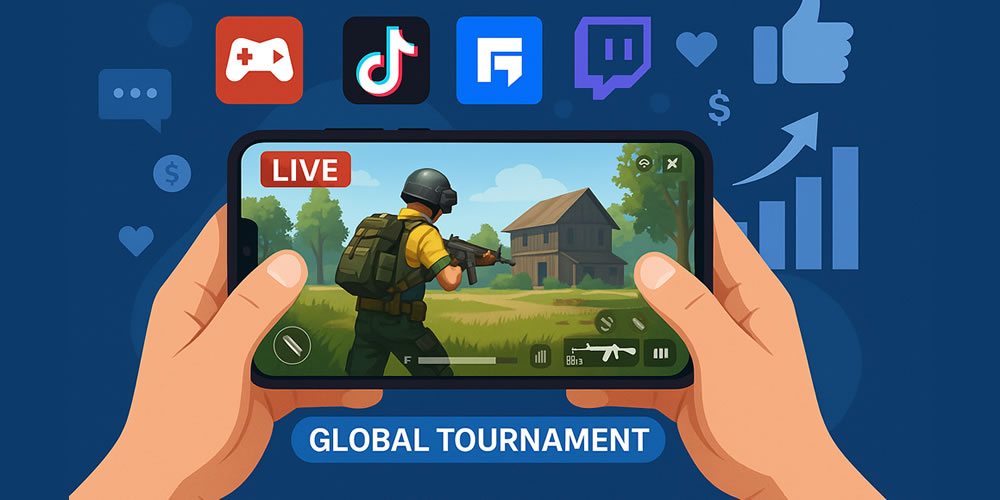The Growth of Competitive Mobile Gaming
Competitive mobile gaming has surpassed casual gaming as the use and appeal of mobile gaming have catalyzed a billion-dollar-a-year industry just on its own. Such titles as PUBG Mobile, Free Fire, Mobile Legends: Bang Bang, Clash Royale, etc. have developed passionate users and global audiences that sometimes eclipse traditional PC and console titles in engagement and revenue. The rise of professional tournaments with multimillion-dollar prize pools and viewers numbering in the millions has made mobile esports a force to be reckoned with. One of mobile gaming's most valuable assets has been the embedding of social media into the ecosystem. Social media acts not only as a promotional activity tool but also as a broadcasting medium, community center, and engagement measure for game developers and sponsors.

Social Media Platforms Leading the Way
The international excitement around mobile gaming tournaments emerges fundamentally from platforms with immediacy, interaction, and mass export capabilities. They include:
- YouTube Gaming: YouTube is the crown jewel of sites for live-streaming tournaments and replays of matches. Developing formal partnerships with mobile game developers to provide coverage of their events, YouTube has/does hosts dedicated channels that deliver tournament coverage and boast millions of subscribers.
- Facebook Gaming: Facebook is an especially effective platform for interaction with creators because of its built-in tools for creators, but the layout of official esports pages provides tremendous branding opportunities in territories where mobile gaming experiences mass audiences, regionally in Southeast Asia and Latin America, Facebook dominates as the leading channel and creator.
- Twitch: While Twitch's origins were based around "PC-first" streaming, it's home to the best in the industry for delivering mobile gaming events. Esports organizations will leverage Twitch to provide content exclusively as a behind-the-scenes or player-view experience.
- TikTok: TikTok's value as an engagement platform is based substantially on its short-form video content by influencers, highlights of the game, and behind-the-scenes tournament interactions, which are vital for active community engagement. The use of various #hashtag trends and challenges enables massive exposure.
- Twitter and Instagram: Twitter and Instagram are unmatched for content delivery related to quick updates, fan interactions, and official tournament branding. Memes, short snippets of highlights, fan art, and other original content foster virility and provide a breadth of engagement.
Budget Allocations and Monetization Models
Game developers and sponsors spend large amounts on logistics and digital marketing for mobile gaming tournaments. A lot of the budget for social media advertising has a few things to account for, such as:
- Influencers to promote the event before and during the tournament.
- Paid purchase campaigns targeting the competitive gaming audience.
- Exclusivity on the platform to capture the streaming rights and paid content branded campaigns.
The return on investment for social campaigns typically measures production value through views, shares, clicks, and conversions, which often helps determine sponsorship and subsequent tournaments.
Community Engagement and Real-Time Interaction
Live comment sections, fan polls, Q&As, and giveaways create an interactive experience so the audience feels part of the action. Engagement is pertinent to audience retention and community growth. Esports organizations often employ social media managers to deal with fan engagements, meme content, and crises during tournaments.
Integration of Smart Betting into the Ecosystems of Esports
As mobile games mature into competitions (mobile tournaments), so do their monetization ecosystems, including esports betting. Many mobile apps and platforms allow fans to bet on match outcomes, MVPs, and in-game objectives. One common type of integration is the 1x bet apps for mobile betting, whereby the user can access betting on active matches directly from their played games to allow for seamless continuity from competition to gaming. These apps utilize up-to-the-minute data and odds, have influencer advertising and in-game advertisements, and were designed to shift entertainment and sports wagering together incrementally.
A New Era of Mobile Esports Promotion
The converging ecosystems of mobile gaming tournaments and social media show how the future of digital entertainment is changing and writing itself. The streaming quality is improving, and mobile game development is consistently growing. What's next? As a result, the boundaries of casual play and high-level competitive gameplay continue to dissipate. Social media supports more than just reaching a tournament. Its functioning serves as a space for everybody, including fans, example brands, and players to exist. We're still far from understanding the complete potential of mobile gaming tournaments, as it will solely depend on what is next if we adapt and innovate the social platforms.
































